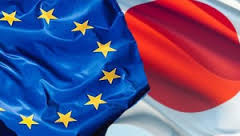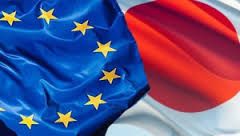
Making the United States think twice over pursuing inward-looking policies and standing against a protectionist tide threatening the global economy, a free trade deal is being aimed to be reached between the Japanese and European Union through a negotiators’ meeting in Tokyo.
With almost daily meetings to overcome key hurdles, including tariffs on Japanese automobiles and car parts and European wine, cheese, pasta and other foods, talks have intensified since last week, even though Japan and the EU have been negotiating since 2013.
President Donald Trump withdrew the United States from the Trans-Pacific Partnership, or TPP, earlier this year and a Japan-EU deal could leave U.S. firms at a disadvantage.
"There is an atmosphere among negotiators that Japan and the EU need to stop protectionism that is prevailing in the world," said a source familiar with the issue who declined to be identified because talks are ongoing.
"The momentum is building for Japan and the EU to take leadership in promoting and executing free trade."
She could sign a provisional deal with Japan as early as next week, said EU trade chief Cecilia Malmstrom said on Monday in a sign of optimism.
The media quoted another source, who declined to be named while negotiations were underway, as saying that an agreement between the EU and Japan would "send a strong message to the United States that free trade is important and that you shouldn't be too inward looking."
The other 11 members of the Pacific Rim trading bloc, including Japan, in limbo after Trump’s decision to walk away the TPP, as he favors bilateral trade deals over multilateral accords.
Trades between Japan and the EU has a lot of room to grow - EU forecasts reckon by as much as a third although, together Japan and the EU account for about a third of global GDP.
Compared to Japan-China trade of $262 billion and Japan-US trade at $192 billion, Japan-EU bilateral trade totaled $144 billion last year.
There is a sense in the EU camp that people will start to lose faith if they cannot wrap it up this year after unsuccessful attempts to conclude a deal with Tokyo the past two years.
Scraping of a 4 percent tariff on many car parts and phasing out the EU's 10 percent tariff on Japanese passenger cars over the next five to 10 years is the demand of Japan. Reduction of its 15 percent tariff on wine and up to 30 percent on cheese by Japan is demanded by Europe on the other hand.
The Japanese side is digging in on dairy for now.
"Our number of dairy farmers is in decline, but we have a plan to strengthen our dairy industry, so I would like to ask for understanding," Agriculture Minister Yuji Yamamoto told reporters on Tuesday. "I don't think there is room to compromise any further."
Junichi Sugawara, senior research officer at Mizuho Research Institute said that because they compete against European businesses in many of the same markets, an agreement would put American companies at a disadvantage in Japan.
He said that Washington could be convinced to rejoin the TPP using the agreement.
"The U.S. side is likely to come at Japan with strong requests for better market access, but Japan can use a deal with the EU as leverage to lure the United States back to TPP," he said.
(Source:www.reuters.com)
With almost daily meetings to overcome key hurdles, including tariffs on Japanese automobiles and car parts and European wine, cheese, pasta and other foods, talks have intensified since last week, even though Japan and the EU have been negotiating since 2013.
President Donald Trump withdrew the United States from the Trans-Pacific Partnership, or TPP, earlier this year and a Japan-EU deal could leave U.S. firms at a disadvantage.
"There is an atmosphere among negotiators that Japan and the EU need to stop protectionism that is prevailing in the world," said a source familiar with the issue who declined to be identified because talks are ongoing.
"The momentum is building for Japan and the EU to take leadership in promoting and executing free trade."
She could sign a provisional deal with Japan as early as next week, said EU trade chief Cecilia Malmstrom said on Monday in a sign of optimism.
The media quoted another source, who declined to be named while negotiations were underway, as saying that an agreement between the EU and Japan would "send a strong message to the United States that free trade is important and that you shouldn't be too inward looking."
The other 11 members of the Pacific Rim trading bloc, including Japan, in limbo after Trump’s decision to walk away the TPP, as he favors bilateral trade deals over multilateral accords.
Trades between Japan and the EU has a lot of room to grow - EU forecasts reckon by as much as a third although, together Japan and the EU account for about a third of global GDP.
Compared to Japan-China trade of $262 billion and Japan-US trade at $192 billion, Japan-EU bilateral trade totaled $144 billion last year.
There is a sense in the EU camp that people will start to lose faith if they cannot wrap it up this year after unsuccessful attempts to conclude a deal with Tokyo the past two years.
Scraping of a 4 percent tariff on many car parts and phasing out the EU's 10 percent tariff on Japanese passenger cars over the next five to 10 years is the demand of Japan. Reduction of its 15 percent tariff on wine and up to 30 percent on cheese by Japan is demanded by Europe on the other hand.
The Japanese side is digging in on dairy for now.
"Our number of dairy farmers is in decline, but we have a plan to strengthen our dairy industry, so I would like to ask for understanding," Agriculture Minister Yuji Yamamoto told reporters on Tuesday. "I don't think there is room to compromise any further."
Junichi Sugawara, senior research officer at Mizuho Research Institute said that because they compete against European businesses in many of the same markets, an agreement would put American companies at a disadvantage in Japan.
He said that Washington could be convinced to rejoin the TPP using the agreement.
"The U.S. side is likely to come at Japan with strong requests for better market access, but Japan can use a deal with the EU as leverage to lure the United States back to TPP," he said.
(Source:www.reuters.com)





